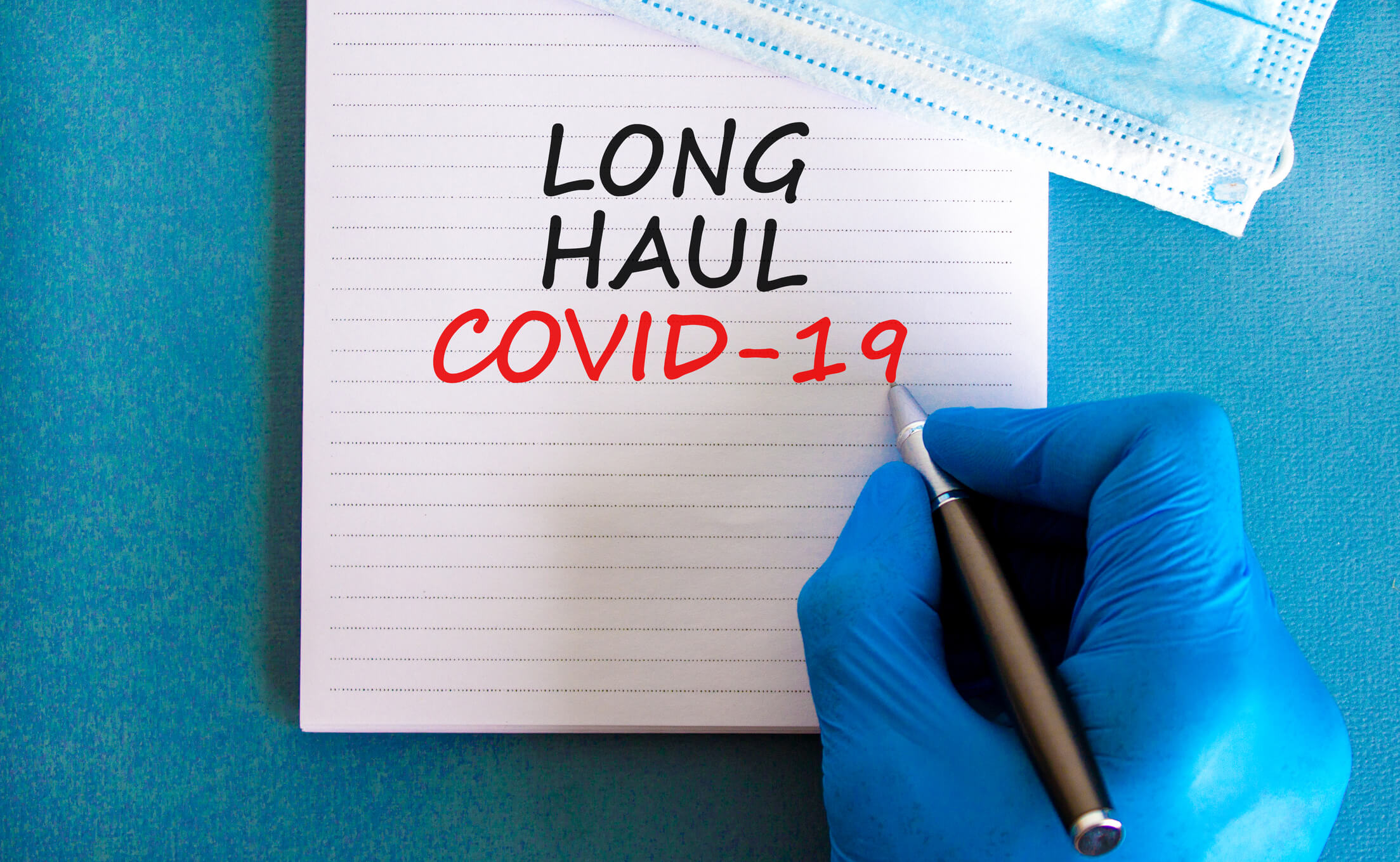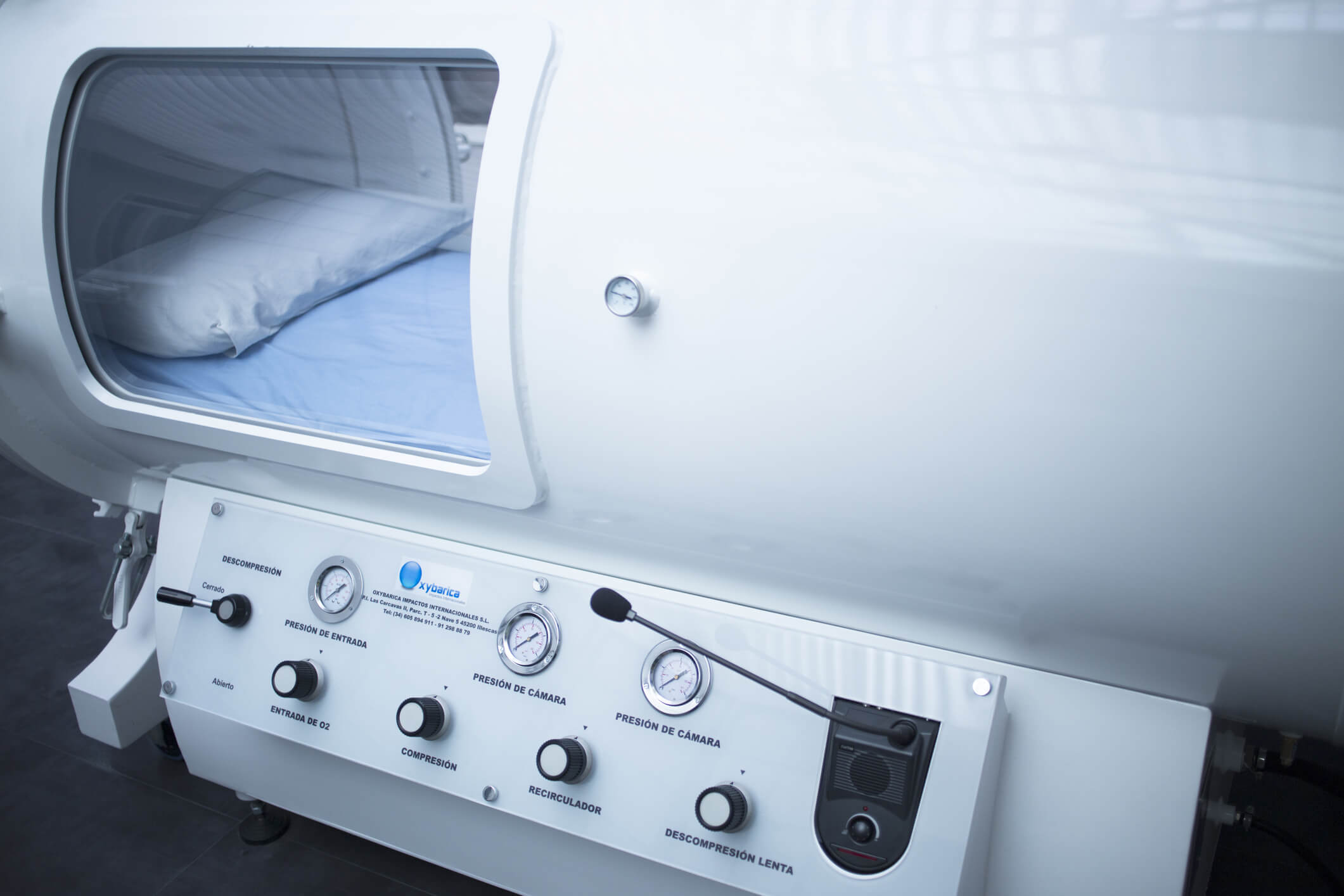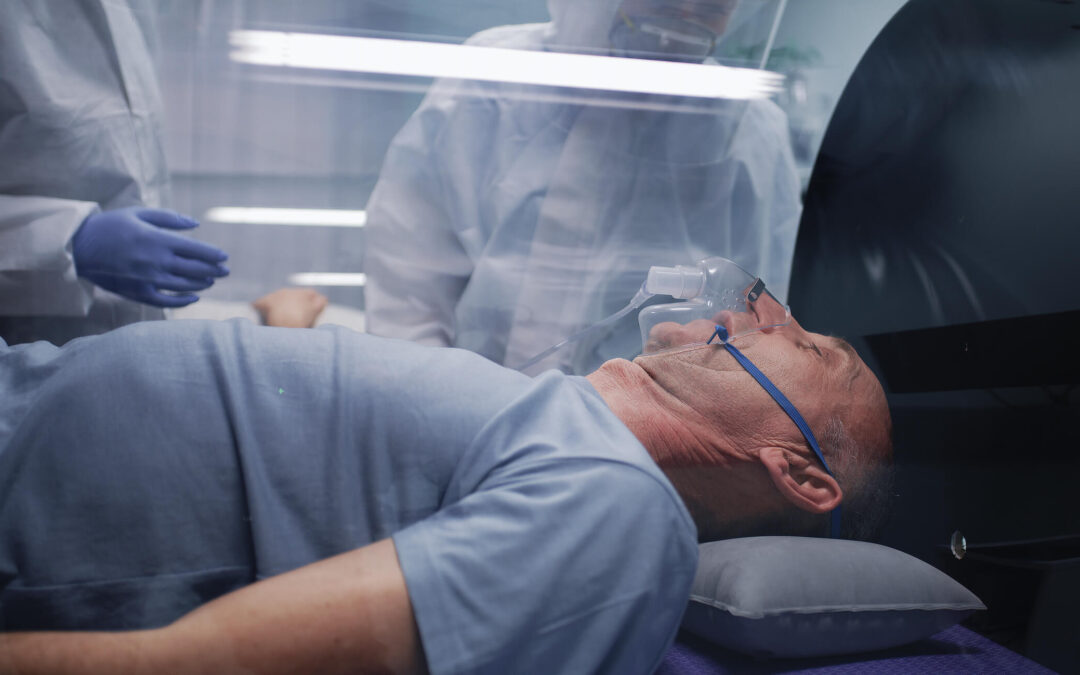Millions have been infected during the past two years by the novel coronavirus COVID-19, which has a variety of effects on the patient. Many people who develop COVID-19 infections recover, but some continue to have symptoms for weeks or even months after the original infection. These COVID patients have a variety of enduring symptoms, such as fatigue, memory issues, brain fog, anxiety, disturbed sleep, altered taste and smell perception, muscle pain, shortness of breath, and gastrointestinal problems. These symptoms can seriously impair people’s daily activities and debilitate them.
Recently, an interesting new study demonstrating how hyperbaric oxygen therapy might enhance neurocognitive abilities and signs of a post-COVID condition, particularly those experiencing protracted COVID, often known as “long haulers,” was released. The effects of extended COVID and the consequences of this latest study are summarized in this post.
There is discussion and worry about what this will do for people’s health when COVID spreads more widely. Long COVID is sometimes compared to the sensation of running a marathon, since both your body and mind are taxed, and there’s no one-size-fits-all solution for how to recover.
It is still far too early to know every one of the potential consequences of the virus itself, according to experts, who believe that more research must be done in order to better understand the cause, long-term ramifications, and viable treatments for people with chronic COVID. However, in light of the recently released data on the possible advantages of using hyperbaric oxygen therapy to those who have recovered from COVID-19 infection, We would like to offer some information that may be useful for those who are affected.
What is Long COVID?
Early on in the pandemic, research indicated that the majority of those who got COVID-19 would become ill and recover completely within a few weeks. A small portion of people, though, continue to feel unwell months after they initially became ill. According to a recent study, one in seven COVID-19 patients who were discharged from a hospital still showed symptoms eight weeks later.
These so-called “long haulers” frequently describe debilitating fatigue, anxiety, depression, brain fog, and a wide range of other symptoms that can make it challenging to get back to their regular life. Chest pain, headaches, and heart issues can all be experienced by certain people. The wide range of symptoms can make it challenging to diagnose extended COVID. However, it’s worth contacting a doctor if you experience multiple of these symptoms that persist for longer than a few weeks. More serious issues including strokes and heart inflammation have also been reported among long haulers.

Symptoms of Long Covid
Long COVID, also known as post-acute sequelae of SARS-CoV-2 infection (PASC), refers to the persistence of symptoms beyond the expected recovery time for COVID-19, which is usually two to four weeks. While some people who had COVID-19 experience a full recovery and return to normal health, others may continue to experience symptoms for months after their initial infection.
Common symptoms of long COVID include:
- Fatigue.Many people with long COVID experience severe and persistent fatigue, even after seemingly mild cases of COVID-19. This can impact their daily activities and affect their quality of life.
- Shortness of breath. Some people with long COVID may experience shortness of breath, especially during physical activity.
- Body aches and pains. Some people with long COVID report ongoing body aches and pains, including muscle and joint pain.
- Cognitive impairment. Some people with long COVID may experience “brain fog,” which can make it difficult to think clearly and concentrate. This can impact their ability to perform everyday tasks.
- Chest pain. Chest pain is another common symptom of long COVID, which may be related to damage to the heart or blood vessels caused by the virus.
- Loss of taste or smell. Many people with long COVID experience a loss of taste or smell, which can persist for weeks or months after the initial infection.
- Sleep disturbance. Long COVID can also cause sleep disturbance, leading to insomnia or excessive sleepiness during the day.
- Depression and anxiety. People with long COVID may also experience depression and anxiety, which can be a result of the physical and cognitive symptoms they are experiencing, as well as the stress of the illness itself.
It is important to note that the symptoms of long COVID can vary widely and that not everyone who had COVID-19 will experience them. In some cases, symptoms can improve over time, while in others they may persist or even worsen. If you have ongoing symptoms after having COVID-19, it is important to speak with your healthcare provider to determine the best course of treatment.
The Immune Systems Role in Long COVID
Although the precise cause of long COVID remains unknown, research indicates that a number of variables, such as an excessive immune response and harm to both the lungs and brain, could be responsible.
The immune system’s function in preventing and healing from COVID-19 is a topic of much discussion nowadays. People with an excessively active immune system seem to be more likely to experience severe symptoms from the virus, according to one idea that has gained support. This hypothesis is supported by the observation that individuals with specific autoimmune diseases, such as lupus as well as rheumatoid arthritis, appear to be at an increased risk for severe COVID-19. It is believed that a hyperactive immune system may result in excessive inflammation, which might have catastrophic effects. However, the precise pathways are still unknown.
Treatment Options for Long COVID
Although there is no known treatment for long COVID, leading a healthy lifestyle may help with symptoms. Regular activities include:
- Regular exercise
- Stop smoking
- Eat a well-balanced diet.
- Get enough rest.
- aerobic activity
What is HBOT?
HBOT is just breathing 100% pure oxygen at such a higher air pressure. This enables the body to take in more oxygen, which can then be used to treat injuries or fight infections.
Divers who are impacted by the abrupt shift in atmospheric pressure around them have historically been treated with hyperbaric oxygen therapy.
Decompression sickness is what this is also referred to as. However, you may call it the “bends.”
Its application has been extended to a wide range of other conditions, such as burns, carbon monoxide poisoning, and diabetic wound infections. It is secure and rarely causes issues when administered in the appropriate situation.
In a recent study, researchers found that HBOT helped patients with long-lasting COVID symptoms, including:
- depression
- fatigue
- Pain obstruction
- Decreased executive ability
The Food and Drug Administration (FDA) also issues a warning against having unrealistic expectations while treating COVID-19 or long COVID with HBOT, adding that research is still being done and that the medication is not yet FDA-approved.
Potential Risks of Hyperbaric Treatment
Hyperbaric oxygen therapy (HBOT) is generally considered a safe medical treatment, but there are potential risks associated with it that must be taken into consideration.
One of the most significant risks associated with HBOT is the risk of oxygen toxicity. Prolonged exposure to high levels of oxygen can lead to oxygen toxicity, which can cause symptoms such as nausea, dizziness, and confusion. In severe cases, oxygen toxicity can lead to seizures and even death.
Another risk associated with HBOT is barotrauma, which is caused by the pressure changes that occur during therapy. Barotrauma can affect the middle ear, sinuses, and lungs, causing pain, discomfort, and even bleeding in some cases.
Additionally, some individuals may experience claustrophobia while inside a hyperbaric chamber. The close quarters and enclosed space can be unsettling for some people, leading to anxiety and panic attacks.
It is also important to note that HBOT may not be suitable for everyone. Individuals with certain medical conditions, such as lung disease, may not be able to tolerate the increased pressure and increased oxygen levels associated with HBOT. Additionally, individuals who have had recent surgery or who have certain medical devices, such as a pacemaker, may not be able to undergo HBOT.
While HBOT is generally considered a safe medical treatment, there are potential risks associated with it that must be taken into consideration. Individuals who are considering HBOT should speak with their doctor to determine if it is appropriate for them and to discuss any potential risks and benefits.
Benefits of Hyperbaric Treatment for Long Covid
Hyperbaric oxygen therapy (HBOT) is a medical treatment that involves breathing 100% pure oxygen inside a pressurized chamber. The increased pressure forces the oxygen to dissolve in the plasma and tissues, providing the body with more oxygen than it would receive from normal air. This increased oxygen supply can help to speed up the healing process and improve the body’s ability to fight infections.
In the case of Long Covid, HBOT has shown promise as a potential treatment option. Long Covid refers to the ongoing symptoms experienced by some individuals even after they have recovered from the acute phase of COVID-19. These symptoms can range from fatigue and muscle weakness to brain fog and difficulty concentrating.
One of the ways that HBOT may be beneficial for Long Covid patients is by helping to improve tissue oxygenation in the body. The increased oxygen supply provided by HBOT has been shown to help reduce inflammation and improve cellular metabolism, which can help to speed up the healing process. Additionally, HBOT has been shown to improve the executive function of the immune system, which can be beneficial in fighting off infections and helping to reduce the severity of symptoms in Long Covid patients.
Another benefit of HBOT for Long Covid patients is that it can help to improve the function of the mitochondria, the parts of cells that generate energy. In some cases, Long Covid patients may experience mitochondrial dysfunction, which can lead to symptoms such as fatigue and muscle weakness. By improving the function of the mitochondria, HBOT may help to reduce the severity of these symptoms and improve overall health and well-being.
It is important to note that while HBOT has shown promise as a potential treatment option for Long Covid, more research is needed to fully understand its potential benefits and the best way to use it in the treatment of this condition. Additionally, HBOT should not be considered a replacement for traditional medical treatment, but rather as a complementary therapy that may help to improve overall health and well-being.
HBOT has the potential to provide numerous benefits for Long Covid patients, including improved oxygenation, reduced inflammation, improved immune function, and improved mitochondrial function. However, more research is needed to fully understand its potential benefits and the best way to use it in the treatment of this condition.

The Role of Hyperbaric Oxygen in Treating Long COVID
Long COVID is a syndrome about which we currently know very little, but hyperbaric oxygen therapy (HBOT) is now a viable treatment option. 100% oxygen is inhaled during HBOT, a therapy that uses a pressurized chamber. As a result of the pressure created during such a hyperbaric treatment session, oxygen is capable of reaching higher levels in the blood and tissues, which reduces inflammation and aids in healing and recovery.
Hyperbaric Oxygen Therapy And Inflammation
There are a number of ways that HBOT lowers inflammation. HBOT promotes the synthesis of anti-inflammatory growth factors and cytokines by raising the amount of dissolved oxygen in the plasma. In order to lessen the overall inflammatory response, HBOT can also boost the activity of anti-inflammatory genes.
It has been demonstrated that HBOT’s anti-inflammatory properties are beneficial in treating a number of ailments, including autoimmune diseases and recent injuries. Given the part inflammation plays in long-term COVID, long haulers might find HBOT to be a helpful therapy choice.
Clinical Trials for Hyperbaric Treatment of Long Covid
Clinical trials for the hyperbaric treatment of Long Covid are ongoing, with the aim of establishing the safety and efficacy of this treatment for patients who are suffering from the long-term effects of the disease.
Hyperbaric Oxygen Therapy (HBOT) is a medical treatment in which the patient breaths pure oxygen while enclosed in a pressurized chamber. It has been demonstrated that patients may benefit from this elevated oxygen content in a number of ways, including enhanced tissue oxygenation, decreased inflammation, and better immune function.
While HBOT is not specifically approved by regulatory bodies such as the FDA for the treatment of Long Covid, clinical trials are underway to evaluate its effectiveness for this patient population. These trials are designed to determine if HBOT is safe and effective for patients with Long Covid, and to identify the optimal dosage, duration, and frequency of treatment.
One of the challenges of conducting clinical trials for HBOT is that Long Covid is a complex disease with a wide range of symptoms and potential causes. As a result, it is important that clinical trials are well-designed and well-conducted to ensure that accurate and reliable results are obtained.
Despite these challenges, there is a growing body of evidence that suggests that HBOT may be a promising treatment option for patients with Long Covid. However, more research is needed to establish the safety and efficacy of HBOT for this patient population, and clinical trials are an important step in this process.
Clinical trials for the hyperbaric treatment of Long Covid are ongoing and show promise for the potential benefits that HBOT may offer to patients suffering from the long-term effects of the disease. However, more research is needed to establish the safety and efficacy of this treatment and to determine the optimal dosage, duration, and frequency of treatment.
Hyperbaric Oxygen for Long COVID Supported by Research
There is now ongoing research into treatment options for extended COVID, and several promising possibilities are being followed up on. There is some indication that hyperbaric oxygen therapy may also be useful in reducing the symptoms of protracted COVID. Hyperbaric oxygen therapy has been proved to be successful in treating a number of illnesses, such as strokes and brain injury. In a tiny study conducted in Israel, it was discovered that hyperbaric oxygen therapy significantly reduced fatigue, shortness of breath and brain fog in a group of long-term COVID patients, as well as its symptoms and quality of life.
By enhancing the amount of oxygen which reaches the tissues, oxygen under pressure could aid in the reduction of inflammation and the promotion of healing. Hyperbaric oxygen therapy could be a viable treatment option for “long haulers” who are suffering from a COVID-19 infection, although further research is required to confirm these findings. Although larger and more carefully planned research is required to support these conclusions, the early findings are positive.
It’s exciting to note that one such study has just been released. For those looking for fresh treatment options, the latest findings from this prospective, randomized study evaluating the effects of hyperbaric oxygen therapy for long COVID cases are promising.You may find this study article here.
Long-term COVID patients’ cognitive and mental function, sleep quality, pain, energy levels, and lung function were assessed in the study by Zilberman-Itskovich, Catalogna, Sasson, et al.
The researchers discovered that subjects who underwent forty sessions of hyperbaric oxygen therapy showed positive improvements in their cognition, degree of exhaustion, sleep quality, and pain patterns. These modifications were attributed by the researchers to increased brain blood flow and neuroplasticity seen on MRI scans. After an injury, the brain builds and rearranges synaptic connections between nerve cells in a process known as neuroplasticity.
This study offers proof of how hyperbaric oxygen therapy may help some individuals who are suffering with COVID-19’s long-term side effects.
Conclusion
It has become more and more obvious as the pandemic has spread that not every person who acquires COVID-19 will become sick mildly and recover quickly. Only a small portion of individuals, referred to as “long haulers,” continues to have symptoms months after falling ill.
According to new research, hyperbaric oxygen therapy may be able to help some individuals who are dealing with the long-term symptoms of COVID-19.
The process of hyperbaric oxygen therapy (HBOT) carries relatively minimal dangers in general. The majority of patients tolerate HBOT effectively and don’t have any negative side effects. Before beginning therapy, it’s crucial to be examined by a hyperbaric medicine professional to determine whether HBOT is the best option for you and to rule out any potential risks.
FAQs
Here are some few frequently asked questions.
How does Hyperbaric Oxygen Therapy work for Long Covid patients?
Hyperbaric Oxygen Therapy works by increasing the amount of oxygen in the patient’s bloodstream, which can help to improve the function of the immune system and reduce inflammation, among other potential benefits.
Is Hyperbaric Oxygen Therapy an approved treatment for Long Covid?
Hyperbaric Oxygen Therapy is not specifically approved by regulatory bodies such as the FDA for the treatment of Long Covid, but it is used off-label for a variety of conditions, including Long Covid.
How long does a typical Hyperbaric Oxygen Therapy session last?
The length of a Hyperbaric Oxygen Therapy session can vary, but they typically last between 60 and 90 minutes.
How many sessions of Hyperbaric Oxygen Therapy are typically needed for Long-Covid patients?
The number of Hyperbaric Oxygen Therapy sessions needed for Long Covid patients can vary based on the individual case. Some patients may need a few sessions, while others may need several weeks or months of treatment.
Get rid of Long Covid with our hyperbaric treatment
Suffering from Long Covid and feeling hopeless? Say goodbye to the lingering symptoms and get back to your life with our hyperbaric treatment! Our state-of-the-art hyperbaric chambers and licensed medical professionals are here to help you get rid of Long Covid once and for all. Our HBOT has been shown to have a number of potential benefits for patients. Our treatment protocol is designed to help you get the most out of HBOT, with a focus on your individual needs and goals.
Don’t let Long Covid control your life any longer. Get in touch with us today to learn more about our hyperbaric treatment and how we can help you get rid of Long Covid once and for all. Book your appointment now!
For more information on how https://hyperbarictherapylasvegas.com/ can help you on your Hyperbaric Treatment, please contact us at (702) 476 4356, or visit us here:
7650 W Sahara Ave Suite 301, Las Vegas, NV 89117, United States
Hyperbaric Chamber Therapy in Las Vegas, NV

